Profile: Clare Lyle
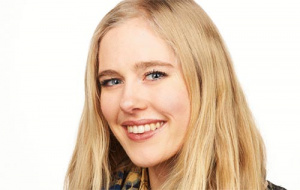
Clare Lyle, (2018, DPhil Computer Science)
Clare Lyle (2018, DPhil Computer Science) is a Rhodes Scholar from Canada working on the theoretical understanding of machine learning. She writes a blog about maths and computer science and tweets @clarelyle.
Why did you decide to pursue further study?
I have wanted to be a scientist for as long as I can remember. I was the type of kid who read encyclopedias for fun and asked for a microscope for Christmas, although research didn’t feel like a concrete career path until I started university, since that was the first time I got to meet real live scientists who actually did the thing I was so obsessed about for a living. I was incredibly fortunate to have the opportunity to work with supportive advisers on a number of undergraduate research projects. I already knew I liked solving problems from my coursework, but there’s something particularly exciting about working on problems that nobody on earth knows the answer to. I suppose I’m quite fortunate; I enjoyed research a lot and no other career path I looked into seemed as appealing, so the decision to apply to graduate school was easy.
What led you to choose Univ?
As a graduate student, your college is a place for socialising, music, and sports, so I was looking for a college that had a large graduate population, a music society, and a good rowing team. Univ fit the bill on all three counts, and I can’t lie — having a chalet in the alps was a nice perk!
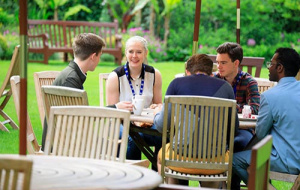 How did it feel to be awarded a Rhodes scholarship?
How did it feel to be awarded a Rhodes scholarship?
Surreal. I’d constructed a detailed plan for my postgraduate study that involved staying on at McGill for a one-year master’s degree, so I was treating the Rhodes application process as a practice run for the next year when I’d be applying “for real”. I was pleasantly surprised (to put it lightly) when I found out I’d received it on my first try.
Give your specialist subject elevator pitch.
Deep learning is a field of AI that allows computers to recognize faces, translate text, play games like chess, go, and Starcraft at superhuman levels, and diagnose cancer better than trained radiologists. Despite its apparent superpowers, it also fails in surprising and unpredictable ways. Changing a handful of pixels of an image of a panda can cause state-of-the-art classification systems to confidently predict it to be a gibbon. Our understanding of why deep neural networks work as well as they do, and also fail as spectacularly as they do, is still in its infancy. My research focuses on developing theoretical tools that can offer insight into these topics, and will hopefully allow us to improve the robustness and effectiveness of deep learning algorithms.
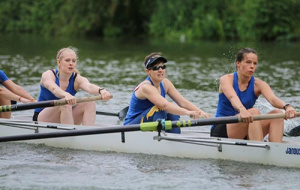
Clare rowing for UCBC
What else do you enjoy doing apart from your DPhil in Oxford?
I enjoy being active, so I spend most of my free time playing basketball for the University and rowing with UCBC. I’d highly recommend getting involved in College and University sport to anyone considering it. It’s a fantastic way to make friends and get involved in the College community. The Rhodes community also offers a number of options for things to do outside of my DPhil, ranging from evening talks to multi-day conferences to Scholar-led organisations that work on projects year-round. This past year I was part of the Rhodes AI Lab working on machine learning models to detect toxic comments for online content moderation.
Has anything surprised you about Oxford? Any challenges you have faced in your first DPhil year?
Although I’d known that the DPhil is much less structured than an undergraduate degree, the adjustment was still quite abrupt. The challenging aspect of an undergraduate degree comes from having to figure out how to solve difficult problems, but the problems themselves have been selected by an expert so as to be not too hard but not too easy, and to make use of tools you’d been taught in your courses. In a DPhil, you have to find the problems yourself, to figure out what tools might be useful to solve them, and to make sure that nobody has solved them already. The skill of finding good problems to work on is one that is hard to develop outside of a research position, and takes a lot of work to become good at.
Do you have advice for prospective students?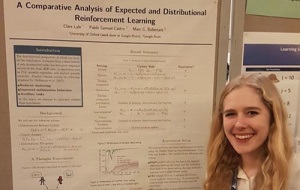
My biggest piece of advice would be to figure out what you want to get out of a degree, and do your research on where the best place is to do that. Oxford has a lot of great research groups, but it can take some digging to figure out where the best fit for you is located. For example, there are people working on machine learning in at least four different departments in Oxford (more if you include applications to other fields, like deep learning for medical imaging), so a prospective DPhil might apply to computer science, statistics, engineering, or neuroscience. It’s incredibly helpful to talk to people already in Oxford, if you know them, but if not then the University website offers a lot of information.
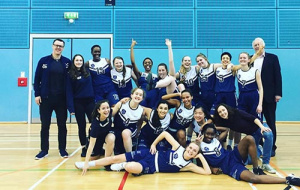
Clare with the Oxford University Basketball team
How do you feel about the celebration of 40 years of women at Univ?
Today, women play such a significant role in the Univ community that it’s hard to believe that we’ve only been admitted to the College for the past 40 years. I think it’s fantastic to celebrate the achievements and contributions of women to both College and the broader society, but I also hope that reflecting on 40 years of women at Univ inspires us to go further in ensuring that capable people are able to access opportunities and communities that will help them achieve their full potential. We might not bar people from higher education for the crime of having a uterus these days, but there are still lots of ways that bright students aren’t able to access higher education. Univ already runs a number of impactful programs to encourage and prepare students from under-represented backgrounds to apply to selective universities, and I hope that we as a community will continue to work on the problem of access at Oxford.
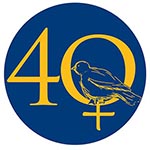 Women at Univ 2019. Celebrating 40 years of achievement by women students, academics and staff, and recovering the history of women in the College from 1249 to the present day.
Women at Univ 2019. Celebrating 40 years of achievement by women students, academics and staff, and recovering the history of women in the College from 1249 to the present day.
Published: 10 September 2019
